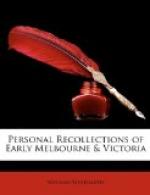I arrived just to witness the last glories of the famous champagne lunches, which prefaced the auction sales of these early days, and repeatedly I saw in his element Charles Williams, the earliest of his trade. If such lunches cost 40 pounds, which was given me as a moderate average, who suffered, argued their justifiers, if the exhilaration they produced gave 400 pounds more to the net proceeds? The brisk liquor appreciably blew up the prices, as the same lots, cut up and rearranged, would come again and yet again under the hammer. Many a bullock-drover would pull up on passing the auction room or tent, and quaff off half a bottle to the good health of all concerned in such liberality. One respectable old colonist was said to have almost lived on those lunches in the dear early times, so regularly did he encourage and patronize them. The bidding public were regaled before the sale, but the auctioneer and his clients after—a plan which made very much the better business, as might have been seen by the effects in either case. Williams began with 4,000 pounds a year profits, which I dare say went on to the rate of 10,000 pounds for the brief term. He was just finishing what, for those times, was a fine villa on the Yarra-bank, beyond Richmond, when the rapidly receding tide left him, as well as many others, stranded.
Great gum-tree stumps were grievously prevalent, alike in Melbourne streets and allotments. Swanston-street was special in this way, and they long flourished upon allotments about where the city hall at first stood. One huge stump, just touching the Collins-street line where the Criterion Hotel was afterwards built, long held defiant existence, the wooden building of the time having deviated to go round it. When at length the lot came to be sold by Mr. James Purves, a well-known early allotment-monger, whom I recollect on this occasion descanting on the future prospects of so central a site, the buyer had the too long-endured enemy attacked and extirpated.
THE MELBOURNE CORPORATION, 1842.
“When forty winters shall besiege thy brow,
And dig deep trenches in thy winter’s field.”
—Shakespeare, Sonnet 2.
The corporation arose towards the end of 1842, and then the anti-stump warfare began. My friend Henry Condell, like so many other early birds a Tasmanian (a Vandemonian was the ill-omened name at that time), was the first mayor. The times were bad, and the shilling rating caused a growl, but the new body held its way. John Charles King, an Ulster man, and of good abilities, was the first town clerk. His successor, William Kerr, had greater abilities, but not equal method and activity. Both were strong Orangemen—a feeling, however, for which this colonial ground was not favourable.




